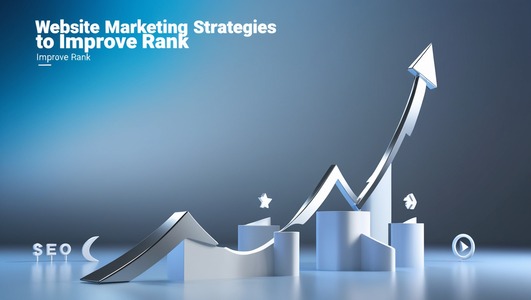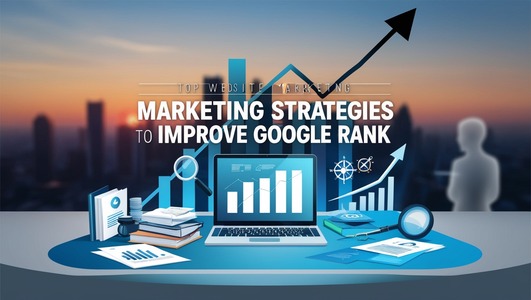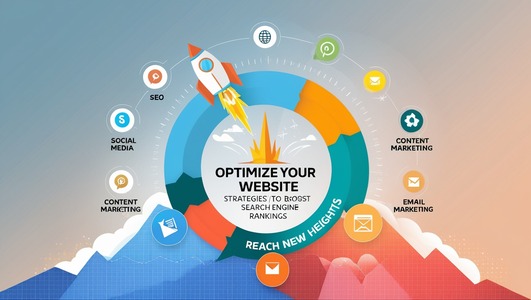Website Marketing Strategies to Improve Google Rankings
In the digital age, having a website is no longer enough. To stand out from the competition and attract your ideal audience, you need to implement effective Website Marketing Strategies. These strategies not only improve your site’s visibility in search engines but also increase organic traffic, improve conversions, and strengthen your online brand.
In this article, we’ll explore the most important website marketing strategies in depth, how to implement them, and the benefits you can gain from doing them correctly.
What Are Website Marketing Strategies?
Website marketing strategies refer to a set of techniques and actions designed to attract visitors to a website, maintain their interest, convert them into customers, and foster loyalty. These strategies combine different digital marketing disciplines, including SEO, content marketing, social media, email marketing, and paid advertising.
The ultimate goal is to create an online ecosystem where your website acts as the hub for all your marketing activities.
1. Search Engine Optimization (SEO)
SEO is the cornerstone of any online Marketing strategy. It involves optimizing your website to appear in the top search results on Google and other search engines.

Key Elements of SEO:
Keywords: Use relevant terms such as website marketing strategies, Google ranking, online visibility, etc.
On-Page SEO: Includes optimizing titles, descriptions, headings, URL structure, use of images, and internal links.
Technical SEO: Ensures good loading speed, responsive design, indexability, and a clean architecture.
Off-page SEO: Strategies such as link building or creating quality external links pointing to your site.
Implementing an effective SEO strategy can significantly increase organic traffic and attract users who are actively searching for your products or services.
2. Content Marketing
Content is king in any digital marketing strategy. Creating and sharing relevant and valuable content helps educate your audience, gain their trust, and improve your SEO rankings.
Useful content types:
Blog: Informative posts optimized for your main keywords.
Guides: Long-form content on specific topics, like this guide from Website Marketing Strategies.
Videos: Increase dwell time and are highly shareable.
Infographics: Visual content that’s easy to digest and share.
Ebooks and Whitepapers: Perfect for generating leads through forms.
A solid content marketing strategy improves your brand authority and nurtures your prospects at every stage of the sales funnel.
3. Social Media and Content Promotion
Social media are not just communication channels, but powerful marketing tools. They allow you to amplify your content, build a community, and drive traffic to your website.
Key Platforms:
Facebook: Ideal for targeted campaigns and viral content.
Instagram: Perfect for showcasing products and attracting a visual audience.
LinkedIn: Excellent for B2B marketing and professional content.
Twitter (X): Useful for sharing content and participating in real-time conversations.
TikTok and YouTube: Powerful platforms for video content.
Strategic use of social media can improve your site’s visibility, increase engagement, and strengthen your SEO ranking through traffic.

4. Online Advertising (SEM and Social Ads)
Paid advertising allows you to achieve quick results and target specific audiences. Google Ads and social media ad platforms allow you to create effective campaigns with different objectives: traffic, conversions, brand awareness, etc.
Main advertising channels:
Google Ads: Search, display, shopping, and video (YouTube) ads.
Facebook Ads: Ads on Instagram and Facebook, with advanced targeting.
LinkedIn Ads: Useful for B2B businesses.
Retargeting: Show ads to users who have already visited your website.
Well-designed paid campaigns complement your organic strategies and accelerate website growth.
5. Email Marketing
Although many consider it a traditional technique, email marketing remains one of the most effective strategies in terms of ROI.
Key benefits:
Direct communication with your audience.
6. Conversion-Driven Web Design (CRO)
Getting traffic to your website isn’t enough if users don’t convert. Conversion Rate Optimization (CRO) focuses on improving design and content elements to maximize conversions.
Essential CRO elements:
Clear calls to action.
Optimized forms.
Intuitive navigation.
A/B testing of design and content.
Mobile-responsive design.
A good web design is not only visually appealing but also guides the user to the desired action.

7. Analytics and Measurement
What isn’t measured can’t be improved. To know if your Website Marketing Strategies are working, you need to constantly monitor the results.
Recommended tools:
Google Analytics 4: To measure traffic, behavior, conversions, and more.
Google Search Console: To understand how your site ranks and resolve indexing errors.
Hotjar or Microsoft Clarity: Show how users interact with your website (heat maps, recordings).
CRM and automation tools: To understand the complete customer journey.
Analytics allow you to make data-driven decisions and adjust your strategies for better results.
Message personalization.
Process automation (funnels, welcome sequences, promotions).
Generation of recurring traffic to your site.
Use tools like Mailchimp, Sendinblue, or ActiveCampaign to create effective and targeted campaigns.
8. Link Building Strategies
Link building is an advanced SEO technique that involves obtaining quality external links pointing to your website. Search engines consider these links as “votes of confidence.”
Effective methods:
Guest posting on relevant blogs.
Create content that others want to link to.
Participate in quality directories.
Networking with influencers and other sites in the industry.
A well-planned link strategy improves web ranking and increases domain authority.

9. Speed and User Experience (UX)
Google has made it clear that user experience is a key ranking factor. Your site should be fast, accessible, and easy to use.
Best practices:
Optimize images and scripts.
Use fast and reliable hosting.
Remove unnecessary plugins.
Make your site mobile-friendly.
Make navigation and access to information easier.
A good UX increases time on site, reduces bounce rates, and improves SEO.
10. Multi-Channel Content Strategy
To reach more users, it’s advisable to implement a multi-channel marketing strategy. This means being present on different platforms with tailored content.
Examples:
Publish an article on your blog → Share it on social media → Create a video version for YouTube → Send it by email → Publish it as a downloadable PDF.
Repurposing content in different formats and channels amplifies the impact of your strategy.
Conclusion: Design and Implement Website Marketing Strategies
Website marketing requires planning, creativity, and constant analysis. It’s not about applying a single technique, but rather combining different Website Marketing Strategies in a coherent way aligned with your objectives.
Whether you’re launching a new website or want to optimize your existing one, these strategies will help you improve your online presence, attract qualified visitors, and convert them into loyal customers.
Credit by Adam Erhart
Why are website marketing strategies important for my business?
They help attract more visitors, improve your online visibility, and boost sales by converting traffic into customers.
What is the best website marketing strategy for beginners?
Start with SEO and content marketing. These are cost-effective and help build long-term organic traffic.
Are paid ads effective in website marketing strategies?
Yes, using paid ads like Google Ads or Facebook Ads can generate quick traffic and leads when done correctly.
How do I know if my website marketing strategies are working?
Use tools like Google Analytics to track metrics such as traffic, bounce rate, conversion rate, and keyword rankings.
How often should I update my website marketing strategies?
Review and adjust your strategies every few months or when you notice a decline in performance.
How long does it take to see results from website marketing strategies?
Organic strategies like SEO can take 3–6 months to show results, while paid campaigns can generate traffic almost instantly.
Can I do website marketing myself, or do I need an agency?
You can start with basic strategies, but hiring a digital marketing agency can save time and bring professional expertise.
Do small businesses need website marketing strategies?
Absolutely! Even small businesses benefit from a strong online presence to compete with larger brands and reach local customers.
Can I do website marketing myself, or do I need an agency?
You can start with basic strategies, but hiring a digital marketing agency can save time and bring professional expertise.
How much should I invest in website marketing strategies?
Budgets vary, but consistency is key. Even a small monthly investment can yield great results if your strategy is well-planned.




